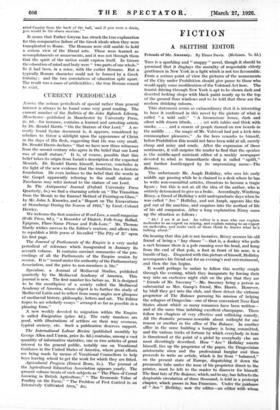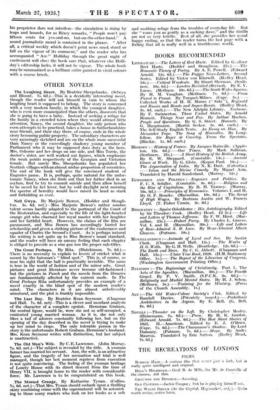FICTION
A SKITTISH EDITOR
Friends of Mr. Sweeney. By Elmer Davis. (Methuen. 75. 6d.) THIS is a sparkling and " snappy " novel, though it should be premised that it displays the morality of respectable elderly gentlemen in New York in a light which is not too favourable. From a serious point of view the pictures of the amusements of the City under Prohibition should give pause to those who would apply some modification of the Volstead Act here. The tourist driving through New York is apt to be shown dark and deserted looking shops with black paint nearly up to the top of the ground floor windows and to be told that these are the modern drinking saloons.
This statement seen-is so extraordinary that it is interesting
to have it confirmed in this novel by the picture of what is called " a wild cafe." " A brownstone house, dark and silent with drawn blinds, . . . set with tables and thick with smoke, . . . and a swarm of people danced on raw boards in the middle . . . the magic of Mr. Volstead had put a kick into commonplace pleasures," As the hero remarks to himself, before Prohibition this would not-have been wild at all, merely cheap and noisy and crude. After the expression of these sentiments, it will surprise the reader to find that the speaker
is the middle-aged assistant editor of a- weekly newspaper devoted to., what in transatlantic slang is called " uplift,"
and further handicapped by its unpromising name—The Balance.
The unfortunate Mr. Asaph Holliday, who sees his early middle age passing while he is chained to a desk where he has to write non-committal articles, threatens to become a tragic figure ; but this is not at all the idea of the author, who is entirely determined to give us a frolic. Accordingly, Winthrop Rixey, a friend of Holliday's wild undergraduate days when he was called " Ace " Holliday, and not Asaph, appears like the god out of the machine, and enquires into the method of life of his old companion. After a long explanation Rixey sums up the situation as follows :
" Ah ! I see it at last. An editor is a man who can explain molecules to an expert on mining, and explain mining to an expert on molecules, and make each of them think he knows what he's talking about."
On hearing that this job is not lucrative, Rixey accuses his old
friend of being a " hay chaser "—that is, a donkey who pulls a cart because there is a pole running over his head, and hung from the end of that pole, a foot in front of his nose, is a bundle of hay. Disgusted with this picture of himself, Holliday accompanies his friend out for an evening's real entertainment,
and then the fun begins.'-
It would perhaps be unfair to follow this worthy couple through the evening, which they inaugurate by forcing their way into an exclusive night club on the plea that they are " friends of Mr. Sweeney "—Mr. Sweeney being a person as substantial as Mrs. Gamp's friend, Mrs. Harris. However, by bluff they get into the club, and there detect the virtuous proprietor of The Balance pursuing his mission of helping
the refugees of Dragovina—one of those convenient Near East States about which so many romances have been written—
and at the same time imbibing excellent champagne. There follow ten chapters of very effective and rollicking comedy.
All the dramatis personae assemble about midnight for one reason or another in the office of The Balance. In another office in the same building a burglary is being committed, and the various tricks of fortune by which everybody in turn is threatened at the point of a pistol by everybody else are most divertingly described. How " Ace " Holliday asserts himself, ties up the proprietor of the paper, the Dragovinian .aristocratic siren and the professional burglar and then proceeds to write an article, which is far from balanced," on the present state of Europe, dispatching it down the pneumatic tube under the nose of his proprietor direct to the printer, must be left to the reader to discover for himself.
The final fate of The Balance, which, sad to say, has fallen to the despicable circulation of three thousand, is told in a postcript
chapter, which passes in San Francisco. Under the guidance of Ace " Holliday, now the editor—an editor with whom
his proprietor dare not interfere-the circulation is rising by leaps and bounds, for as Rixey remarks, " People won't pay fifteen cents for yes-and-no, but-on-the-other-hand." A sound journalistic moral is contained in the phrase. " After all, a critical weekly which doesn't print news must stand or fall on the vigour of its comment," and the reader who has accompanied " Ace" Holiday through the great night of excitement will elos a the book sure that, whatever else Holli- day's editorship lacks, it will not be vigour. The whole book may be summarized as a brilliant satire painted in vivid colours with a coarse brush.























































 Previous page
Previous page